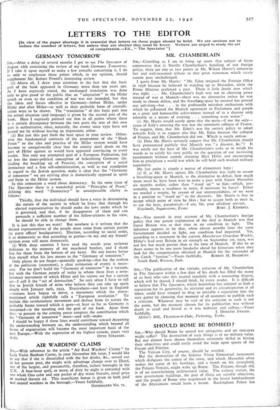MR. CHAMBERLAIN SIR,—Unwilling as I am to bring up anew
that subject of bitter controversy that is Neville Chamberlain's handling of our foreign
policy, there are one or two points in Mr. Wilson Harris's otherwise fair and well-reasoned tribute to that great statesman which surely cannot pass unchallenged.
I quote from Mr. Harris: "Mr. Eden resigned the Foreign Office in 1938 because he believed in standing up to Mussolini, while the Prime Minister preferred a pact. There is little doubt now which was right. . . . Mr. Chamberlain's fault was not in choosing peace instead of war at Munich—there was no alternative unless he was ready to choose defeat, and the breathing-space he secured has proved our salvation—but . . . in the profoundly mistaken enthusiasm with which he presented the Munich agreement to Parliament and people as a great and honourable achievement instead of as a disaster only tolerable as a means of averting . . . something even worse."
(t) Mr. Harris would surely agree that the main—if not the only— cause of Italy's entering the war was the imminent collapse of France. To suggest, then, that Mr. Eden's was he correct policy to adopt towards Italy is to suggest also that Mr. Eden foresaw the collapse of France, and Mr. Chamberlain did not. Which is surely untrue.
(2) Does Mr. Harris seriously suggest that Mr. Chamberlain should have pronounced publicly that Munich was "a disaster, &c."? It was surely not the least of Mr. Chamberlain's tasks so to weigh his words as to satisfy his own public on the question of our increasing rearmament without unduly alarming Herr Hitler and encouraging him to precipitate a world war while he still held such marked military superiority.
My last point is simply a matter of elementary logic: (3) If, as Mr. Harris agrees, Mr. Chamberlain was right to secure a breathing-space at Munich, as the alternative to defeat, how much more must he have been wise to make a pact with Signor Mussolini six months earlier, rather than "stand up" to him—which, pre- sumably, means a readiness to resist, if necessary by force? Either we needed a respite, by reason of our unpreparedness, or we were in a position to "stand up" to the dictators. Mr. Harris is free to accept which point of view he likes ; but to accept both at once is, to say the least, paradoxical.—I am, Sir, your obedient servant,


























































 Previous page
Previous page